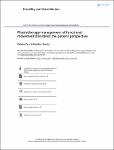Physiotherapy management of functional movement disorders: the patient perspective
| dc.contributor.author | Zeun, D | |
| dc.contributor.author | Hunter, H | |
| dc.date.accessioned | 2023-11-08T14:59:48Z | |
| dc.date.available | 2023-11-08T14:59:48Z | |
| dc.date.issued | 2023-10-25 | |
| dc.identifier.issn | 1464-5165 | |
| dc.identifier.issn | 1464-5165 | |
| dc.identifier.uri | https://pearl.plymouth.ac.uk/handle/10026.1/21623 | |
| dc.description.abstract |
Purpose: People with functional movement disorders (FMD) are commonly seen in neurology clinics. Despite a recent increase in research, no standardised treatment pathway across the UK exists. currently only a few qualitative studies in FMD with a focus on psychological aspects and diagnosis have been published. this study aimed to understand people with FMD perceptions of their physiotherapy treatment.Method: Qualitative web-based interviews were conducted with seven participants and an interpretive phenomenological approach was used to identify themes from the data.Results: Four themes were identified; 1) my brain, mind and body are all me, 2) physiotherapy; what helps and what doesn’t, 3) what recovery is to me, and 4) barriers to treatment. Participants desired a combination of psychological and physical approaches, which were holistic, individualised, and delivered by experienced physiotherapists. limited availability and funding of specialist treatments were barriers to recovery.Conclusion: holistic management combining psychological and physiological systems seems to be crucial for effective management of FMD. large variations in physiotherapy treatment exist across the UK. it is hoped that increasing the understanding, amongst healthcare professionals will lead to the development of timely and appropriate pathways for patients that otherwise find themselves lost between medical specialities. | |
| dc.format.extent | 1-9 | |
| dc.format.medium | Print-Electronic | |
| dc.language | en | |
| dc.publisher | Taylor and Francis Group | |
| dc.subject | Functional neurological disorder | |
| dc.subject | functional movement disorder | |
| dc.subject | qualitative | |
| dc.subject | subjective experience | |
| dc.subject | psychogenic | |
| dc.subject | conversion disorder | |
| dc.subject | physiotherapy | |
| dc.title | Physiotherapy management of functional movement disorders: the patient perspective | |
| dc.type | journal-article | |
| dc.type | Article | |
| dc.type | Early Access | |
| plymouth.author-url | https://www.ncbi.nlm.nih.gov/pubmed/37876224 | |
| plymouth.issue | ahead-of-print | |
| plymouth.volume | ahead-of-print | |
| plymouth.publication-status | Published online | |
| plymouth.journal | Disability and Rehabilitation | |
| dc.identifier.doi | 10.1080/09638288.2023.2272709 | |
| plymouth.organisational-group | |Plymouth | |
| plymouth.organisational-group | |Plymouth|Research Groups | |
| plymouth.organisational-group | |Plymouth|Faculty of Health | |
| plymouth.organisational-group | |Plymouth|Faculty of Health|School of Health Professions | |
| plymouth.organisational-group | |Plymouth|Research Groups|Institute of Health and Community | |
| plymouth.organisational-group | |Plymouth|Users by role | |
| plymouth.organisational-group | |Plymouth|Users by role|Academics | |
| plymouth.organisational-group | |Plymouth|Users by role|Post-Graduate Research Students | |
| plymouth.organisational-group | |Plymouth|Research Groups|FoH - Applied Parkinson's Research | |
| dc.publisher.place | England | |
| dcterms.dateAccepted | 2023-10-14 | |
| dc.date.updated | 2023-11-08T14:59:48Z | |
| dc.rights.embargodate | 2023-11-10 | |
| dc.identifier.eissn | 1464-5165 | |
| rioxxterms.versionofrecord | 10.1080/09638288.2023.2272709 |


